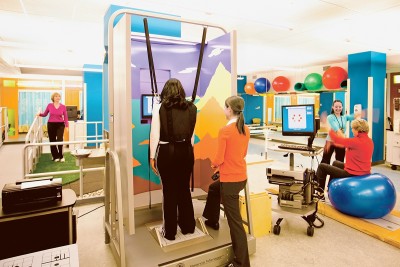
While you’re being treated for breast cancer, you may not have the energy you once did or be able to move your body as easily as before. You may also notice swelling in your arm, hand, or chest area after surgery. Swelling that occurs right after breast cancer surgery is common and usually resolves with time. If the swelling persists, you may have a condition called lymphedema.
If you have any physical problems that start after surgery or during treatment, tell your doctor or nurse so that he or she can refer you to one of our rehabilitation professionals. A physical therapist is available at the Evelyn H. Lauder Breast Center to educate and treat people with lymphedema or limited mobility after surgery, and can advise you on when it’s safe to return to daily activities.
We offer comprehensive physical therapy and occupational therapy services to women undergoing breast cancer treatment as inpatients and outpatients. Our specialists will work closely with you, your family, and your medical team to enhance your quality of life throughout treatment, recuperation, and life after cancer.
Getting Back to Your Routine

Our bodies are designed to move. Many people wonder about the best time to resume their prior activities and exercise routines after cancer treatment. Some people are inclined to start moving right away, while others proceed more cautiously. Either way is fine.
Gentle exercise is a safe way to begin moving your body after surgery, and it can also help you feel more energetic during your treatment. As you get moving and resume your daily activities, pay close attention to the side of your body on which you had your surgery. Take a break if you notice pain, aching, heaviness, or discomfort. When the symptoms go away, you can resume the activity. If you continue to feel symptoms every time you do the activity, or if the symptoms become more frequent, talk with your doctor or nurse.
After completing treatment, exercise can help you maintain your range of motion and strength so that you can return to your normal routine and participate in all the activities you enjoy. Exercise can also help you maintain your normal weight or safely work toward a more ideal body weight.
